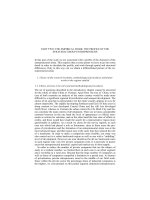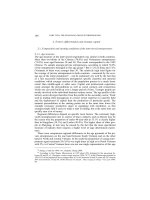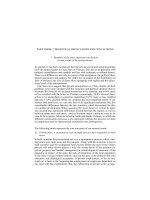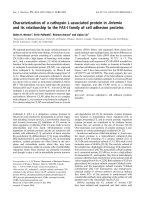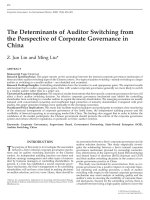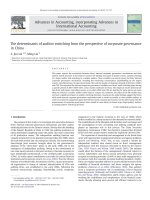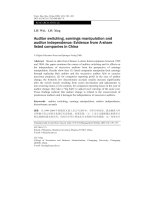communist politics in china and films relationship
Bạn đang xem bản rút gọn của tài liệu. Xem và tải ngay bản đầy đủ của tài liệu tại đây (35.74 KB, 2 trang )
Breaking with Old Ideas is a product of Chinese Community Party chairman Mao Zedong's
concept of a new world in which all social relationships are transformed. Li Wen-Hua made the
film during the last years of the Cultural Revolution in the PRC, People's Republic of China. The
film dramatizes the struggle for proletarian control of education at an agricultural college during
the Great Leap Forward and makes it clear that the leading party members can still promote
bourgeois ideas and only the masses can rectify these leaders to ensure that education truly helps
to build socialism. Breaking with Old Ideas shows an introduction to the politics of the Great
Leap Forward and the Cultural Revolution with concrete examples of how class struggle continues
under socialism and how communists can wage that struggle successfully by mobilizing the
masses to criticize those in positions of authority taking the capitalist road.
Mao launched the Cultural Revolution during his last decade in power to renew the spirit of the
Chinese revolution. "We must reform the arts faculties in the universities. The students must go
down and engage in industry, agriculture and commerce" (201, Reader), said Mao. Mao shut
down China's schools, and during the following months he encouraged Red Guards to attack all
traditional values and "bourgeois" things and to test party officials by publicly criticizing them.
Mao believed that this measure would be beneficial both for the young people and for the party
cadres that they attacked. Breaking with Old Ideas show how Mao's program works and
encourages low class peasants to do the same.
"[Breaking with Old Idea is about] a teacher whose spectacles and manner suggest he is a
backward element undergoes a late but speedy conversion to the cause of educational
popularization. Such changes, however, were but sideshows to the main thrust of the plot" (139,
Reader), said Clark. The film suggests that Mao's idea of Cultural Revolution will make the
country better for the poor peasants and will offer everything they need to make a living including
punishing the capitalist-minded bourgeois. For example, the film starts with the main character
smiling and laughing out loud. The late 1950s brought the forced collectivization of agriculture
and the campaign for the Great Leap Forward, which was to boost China's industrial production.
The happy, energetic, and idyllic scenes contrast with the grim reality of mismanagement in
industry and agriculture, which resulted in a horrible famine in which millions of people starving
to death.
In order to supply the people with food and consumer durables as well as the structure of a
socialist society, labor college was created. Students worked and studied at school to learn
socialism and produce food for their village. In the film, students face a struggle against
bourgeois-minded teachers who do not care about the village but trying to catch up to other
colleges and countries. "We cannot follow the old paths of technical development of every other
country in the world, and crawl step by step behind the others" (195, Reader), said Mao. To
encourage people, film shows the victory of peasants against bourgeois-minded elite by following
what Mao have said.
Mao encouraged students to rebel against authority and inform on their politically incorrect
seniors, and join the Red Guard, the ideological militia that pushed the Cultural Revolution
forward. At one point, Red Guards were fighting pitched battles with government troops outside
of the foreign ministry building. Later on, Red Guard units ended up fighting each other for
supremacy, not completing Mao's unity-criticism-unity. Breaking with Old Ideas show how
people can stand up to the authority and fix what is wrong. A female student stands up for herself
and what she believes in during the criticism meeting. By doing so, people have agreed and
helped her express her opinion to fix their authorities who were controlled by capitalist minds.
Not only that, others were able to gain confidence in what they believe in and stood up for
themselves as well. For example, a student who made money from castrating pigs criticized
himself in front of the whole town. A young girl, the daughter of the vice principle, also showed
the unfairness of her father by showing the letter of recommendation to a famous college in the
city.
Breaking with Old Ideas worked as an advertisement film supporting Mao's new policy, Cultural
Revolution. By showing how the policy can work and give power to the people will help building
a new country gave the poor people hope and dreams to become more than what they currently
are. People were able to participate in the government by criticizing so called "closet capitalists"
who were hiding in government posts and within the CCP itself. In reality, the targets for Mao's
wrath were those he saw as his political enemies. Eventually, the campaign spread to include
targeting members of the scientists and influential professors of universities who were accused of
putting technical expertise ahead of correct political thinking. Unlike the film, the Cultural
Revolution had a disastrous effect on the educational system and the scientific community within
China.

